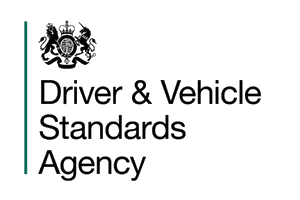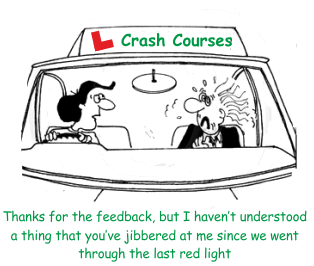
Seven Deadly Sins!

Anger, Gluttony, Greed, Envy, Sloth, Lust, Pride...
Anger: If you get or feel angry with your learners it's time to pay attention to your lesson planning. Or get anger management training!
Gluttony: It doesn't take a lot to pile on the ponds when you are sitting in the instructor's seat all day - chocolate's out of the question!
Greed: With some of the low prices around there are some instructors who could never be accused of being greedy - but greed is a state of mind. If you think driver training is about sitting in the car all day getting 'money for nothing', that's greed.
Envy: There are some instructors in the UK who charge over £30 per hour for regular lessons - but for them, if the grass is greener on the other side, it's probably because it's better looked after.
Sloth: Back to the easy money... Some instructors (hopefully not many) tend to sit in the passenger seat all day - the only effort they put in is to stay awake. Not good for business! (Alternatively: a slow-moving tropical American mammal that hangs upside down from the branches of trees using its long limbs and hooked claws.)
Lust: Sadly some (generally male) instructors succumb to this. The result can be loss of livelihood, rejection by family and prosecution - a sure-fire way to kill your business. (You could try putting bromide in your tea!)
Pride: A great business, or pass rate is a fantastic achievement - but it's important to remember that you can't achieve anything alone, it's not all about you! Your achievements are facilitated by the people and circumstances in your life, it's great that you can make the best of these things but as my Mum would say 'don't get big headed'. Be grateful and be thankful... (I'm so tempted to write something about voting for SmartDriving in this year's Golden L awards here - but I'll resist.)
OOPS! Sorry - Not those deadly sins...

But rather the seven 'top reasons' for Standards-Check disaster.
On Wednesday I reported that the DVSA had released the top seven reasons that are causing instructors to fail the Standards Check. With the check now nearly 2 years old DVSA have conducted a sufficient number of tests for us to assume that these reasons are fairly common and likely to arise in future tests.
I've often said before, failing or getting a low score on Check-Tests, now Standards-Checks, is not a major issue in itself. It's inconvenient and frustrating, but can be sorted out with study and/or training. In fact, I know of instances in the past where a failed check-test has been the springboard that has kicked an instructor into action – and revitalised his career; I'm sure that the same will be the case for some Standards-Check fails.
The biggest problem around poor performance on Standards Checks is the question that it raises about your most important lessons – the lessons you do every day with your customers.
I often hear instructors defending a low test grading with “I had a bad day” or “I was nervous”… "I do better lessons normally".
The same instructors tell me: “My customers are happy.” Maybe that are - but how do you know? And what are they comparing their experience with?
I remember the worst driving lesson I ever sat in on – at the end I asked the driver how she felt about the lesson and her instructor… “Great – He's much better than my old instructor because he never shouts”.
So, unless you get regular assessment from a mentor (or ideally from two or three different mentors with different experience and backgrounds) the Standards-Check is the nearest you are going to get to an honest, independent appraisal of the lesson experience that you deliver. And lesson experience is one of the major factors that determines the lesson rates that you are able to charge.
Rather than feeling defensive about a less than perfect Standards-Check result, take the message on board and use it as a basis for self-development.
You might not fail the Standards Check for the reasons discussed below, you might even come out with an 'A' grade; but what can you do to improve your ‘performance' and service in these areas.
Are you a sinner?
How do you score yourself against the seven common failure headings?
 Goals
Goals
- Was the lesson plan adapted, when appropriate, to help the pupil work towards their learning goals?
At the start of the lesson you need to work with the learner to determine goals for the lesson – note that this involves more than simply asking “What do you want to do?” As a result of the initial ‘goals conversation' you will agree a lesson plan.
The lesson plan will sometimes be a fairly standard ‘set format' lesson in a given area – and might be sufficient to help the learner attain the lesson goals. However, given that everyone is different you need to have the flexibility to make changes ‘on the hoof' where necessary.
Are your learners always comfortable and able to cope with the situation that they are in?
It might be that they are struggling a little with an agreed ‘challenge' – that's fine, as long as they are viewing it as a challenge and happy with the situation. However, if someone is ‘out of their depth' or the exercise is not helping the learner to move towards his/her goals, then YOU need to instigate a change of plan (discussed with the learner).
The ‘inclusion' element is vital. The learner should what they are supposed to be doing and taking responsibility for at all – if things are going wrong because of bad planning on your part, that information should also be shared and the situation corrected.
Risk management
- Did the trainer ensure that the pupil fully understood how the responsibility of risk would be shared?
This is classic ‘Job Sharing' situation – The learner needs to know at all times how the job of ‘managing risk' will be shared. Here's an example given by the DVSA:
“At all times I expect you to drive as carefully and responsibly as possible. I will expect you to be aware of other road users and to control the car. However, I do have the ability to take control of the car in an emergency. I will only use these controls when I feel that you are not dealing with the situation yourself. If that happens we will take some time to talk about what happened so that you understand for next time.”

Learning styles
- Was the teaching style suited to the pupil's learning style and current ability?
Different learners have different preferred ways of learning and understanding. Some like to get ‘hands on' others might prefer to discuss things and ask/answer questions first. If you were to study educational psychology (even as a hobby) you would find that there seem to be almost as many learning and motivational strategies as there are people on the planet!
If you are not familiar with learning styles – spend a little time with Google. (Note - a lot of the traditional 'learning styles theory' still taught in classes and seminars has now been demonstrated to have no validity).
You can find out a lot about how people learn best by noticing how they respond to different teaching methods. It's probably quicker to ask - sometimes you can get a direct answer to questions like ‘How do you learn best?', other times you might have to dig a bit, for example, by finding out about what they like doing at school, or what their hobbies are.
What's really important here is your awareness of the learner's current state. Are they engaged and enjoying the lesson, or are they looking detached or bored? If they are not fully engaged, a different approach will probably help.
How often do you ask “Is there any way I might have helped you differently?”
Taking responsibility
- Was the pupil encouraged to analyse problems and take responsibility for their learning?

DVSA quote:
“A key part of the client-centred approach is development of active problem solving in the pupil. This means that the ADI has to provide time for this to happen and has to stop talking for long enough for the pupil to do the work.”
Effectively this means that it's not your job to do the learning, it's theirs!
How many times have you asked a question and then jumped in with the answer yourself if the learner has not responded early?
The number of ways that you encourage learners to analyse problems and other issues is only limited by your imagination. You might:
- Use comparative demonstration
- Get the learner to try different things (trial and error)
- Offer relevant info to fill any gaps in understanding
- Ask questions
- Pull up to discuss
- Set home learning projects
- Show media clips and discuss the situations
- Replay dash-cam footage
Find out what works for the learner and the situation. But remember – simply ‘telling' does nothing to encourage responsibility.
General feedback
- Was the pupil given appropriate and timely feedback during the session?

The DVSA info about this includes the following:
“All feedback should be relevant, positive and honest. It is not helpful if the pupil is given unrealistic feedback which creates a false sense of their own ability. Where possible, feedback should not be negative. Rather than saying somebody has a weakness, consider expressing it as a learning opportunity. However, if they need to be told something is wrong or dangerous there is no point in waffling. The pupil should have a realistic sense of their own performance.”
Never assume that your learners know when they are doing well or badly. Ask questions to establish their thoughts about any given situation and then confirm, or fill in the gaps. For feedback to be useful it needs to be ‘relevant and timely'. It's not always possible to give immediate feedback because of the situation you are in – but it must be given as soon as practicably possible.
Also… Never assume that your feedback has been understood – ask questions, be aware of body language and facial expression and monitor actions following the feedback.
How often do you ask for feedback about what you are doing? In a good honest relationship your customers can teach you a lot about how you might improve your lessons.
Finally… Remember that eventually, your aim is to develop a driver who does not need your feedback to drive at test-standard (and above). Of course, there will always be information you can offer – this is why Louis Hamilton looks to his pit crew for feedback in order to improve his performance – but too much feedback can hamper the acquisition of self responsibility.
Safety critical feedback
- Was sufficient feedback given to help pupils understand any safety critical incidents?

This is closely linked to general feedback above – but is specific to specific safety related incident, dangerous or potentially dangerous issues.
The same rules apply as with all other feedback in that it should be:
- Honest
- Framed positively
- Specific
- Personal (related to previous relevant issues)
- Timely (offered at the appropriate time)
Learners should be encouraged to consider the cause of the incident, how it could have been avoided or dealt with better and how similar situations can be avoided in future. In order to fully understand the situation you will often need to give feedback about the facts (not judgements!) – better still to elicit feedback; to help the learner to remember/uncover the facts for themselves.
Be aware that some safety-critical incidents are the result of poor or insufficient lesson planning – if this is the case use the situation as a learning experience for both of you. What can be done differently in future; how can planning (journey) issues affect drivers after they have passed the test.
All errors can (and should) be seen and dealt with as learning and development opportunities.
Reflection
- Was the pupil encouraged to reflect on their own performance?
There are still instructors out there who do not seem to recognise the value of a review (lesson recap) at the end of a lesson. I've often seen cars pull up and learners jump out seconds later – and sat in on lessens where the ‘end discussion' was scant or simply non-existent.

Notice that I'm using the term ‘review' rather than ‘recap' – I feel that the term ‘recap' has strong ties with ‘old thinking' where the instructor would offer his/her version of the lesson proceedings. The ‘review' process is a discussion in which both learner (primarily) and instructor consider how the lesson went.
So what is the value?
From a Standards Check/Learning point-of-view the review highlights the learning that has taken place and lessons learned from ‘problem issues'. It will also look forward to further development in future lessons and between lessons. By encouraging the learner to reflect on what went well (and not so well) you ensure that they have a realistic and more objective idea of their progress towards the test and becoming a safe, independent driver.
From a commercial point-of-view the review is absolutely essential. No matter how the lesson goes, well or badly, your customers need to leave your car with a positive outlook – looking forwards to development and improvement. In some situations you will need to help them to re-frame problems so that they see the learning benefits and opportunities.
The danger of a scant or omitted review is that the learner takes away ‘bad vibes' about the lesson – these feelings will be uppermost in their mind when talking to friends, and when considering the value offered by the lesson.
To sum up…
If you look at each of the seven headings they are all concerned with communication between the instructor and learner. This might be outward communication, for example, sharing vital information about the lesson process with the learner, or inward communication, watching body language and/or listening to the learners feedback, answers to questions, etc.
For learning to take place efficiently, effectively and as speedily as possible you must make sure that your learners have all of the information they need - all of the time.
You can find detailed information about all of these Standards Check subjects in the Gold Members Area.
Have a great week.
